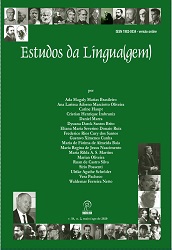On some rules of debate in argumentation of democracies
DOI:
https://doi.org/10.22481/el.v18i2.6229Keywords:
Rhetoric, Argumentation, Discourse analysis, Impeachment, Dilma RousseffAbstract
Argumentation in public spaces for deliberation of open societies implies responsibility. The non-observance of the so-called “rules of the debate” would therefore be an example of the irresponsible public use of the word, making criticism difficult. Thus, one questions whether, regarding the vote of Dilma Rousseff ‘s impeachment in the Chamber of Deputies, these basic rules of argument would have been neglected and how this may have compromised the democratic debate. With the help of language science concepts, such as “denunciation rhetoric”, “conspiracy rhetoric”, “resentment pathos”, “expert ethos”, among others, the research pointed out that, deputies, regardless of their cultural and political orientation, tended to disregard the rules inherent in the debate. Consequently, the Brazilian Parliament understood as the public sphere of deliberation showed to be characteristic of dogmatic societies.
Downloads
References
ANGENOT, Marc. Dialogues de sourds: traité de rhétorique antilogique. Paris: Mille et une nuits, 2008.
ATA da 91ª Sessão da Câmara dos Deputados, Deliberativa Extraordinária, Vespertina, da 2ª Sessão Legislativa Ordinária, da 55ª Legislatura, em 17 de abril de 2016. Sessão: 091.2.55.0. Departamento de taquigrafia, revisão e redação. Câmara dos Deputados. Brasil.
CHARAUDEAU, Patrick. Linguagem e Discurso. São Paulo: Contexto, 2008.
CORTÁZAR, Naiara Galarraga. Olavo de Carvalho, o onipresente oráculo do bolsonarismo. El País. 13 de abr. 2019. Disponível em: < https://brasil.elpais.com/brasil/2019/04/14/politica/1555201232_670246.html >. Acesso em: 21 de ago. 2019.
DANBLON, Emmanuelle. Argumenter en démocratie. Bruxelles: Éditions Labor, 2004.
DANBLON, Emmanuelle; NICOLAS, Loïc. Modernité et “théories du complot”: un défi épistémologique. In: DANBLON, Emmanuelle; NICOLAS, Loïc. Les rhétoriques de la conspiration. Paris: CNRS Éditions, 2010.
DESCARTES, René. Discurso do Método. São Paulo: Nova Cultural, 1996a.
DONOT, Morgan; EMEDIATO, Wander. La construction de la figure des leaders: ethos, identité et charisme en perspective compare. Revue française des sciences de l’information et de la communication, n. 7, 2015. Disponível em: < https://journals.openedition.org/rfsic/1588?lang=en >. Acesso em: 18 de nov. 2019.
LIMA, Helcira Maria Rodrigues de. Na tessitura do Processo Penal: a argumentação no Tribunal do Júri. 2006. 260f. Tese (Doutorado) - Universidade Federal de Minas Gerais, Programa de Pós-Graduação em Linguística. Belo Horizonte, 2006.
MACEDO, Fausto. ‘A jararaca tá viva’, diz ex-presidente. Estadão. 4 de mar. 2016. Disponível em: < https://goo.gl/o8nmF8 >. Acesso em: 05 de dez. 2017.
MAINGUENEAU, Dominique. Cenas de Enunciação. Curitiba: Criar, 2006.
PLANTIN, Christian. L’Argumentation. Paris: Seuil, 1996.
SANTOS, Frederico Rios C. dos. A Retórica da Guerra Cultural no Parlamento brasileiro: a argumentação no impeachment de Dilma Rousseff. 2019. 315f. Tese (Doutorado) - Universidade Federal de Minas Gerais, Programa de Pós-Graduação em Linguística. Belo Horizonte, 2019.
Downloads
Published
Issue
Section
License

Estudos da Língua(gem) is licensed under a Creative Commons Attribution 4.0 International License.
Authors who publish in the journal Estudos da Língua (gem) agree with the following terms:
The journal Estudos de Língua(gem) maintains the copyrights of the contributions published. These rights include the publication of the contribution and make its content available for free through the portal.













